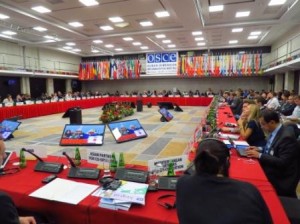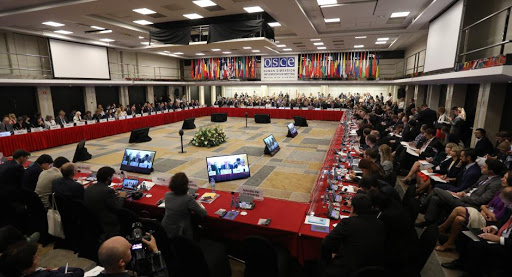Combating intolerance, negative stereotyping, stigmatization and discrimination
based on religion or belief
Report on France OSCE 2014
Submission by CAP Liberté de Conscience
 (Coordination des Associations et des Particuliers pour la Liberté de Conscience – Coordination of Associations and Individuals for Freedom of Conscience)
(Coordination des Associations et des Particuliers pour la Liberté de Conscience – Coordination of Associations and Individuals for Freedom of Conscience)
As part of the Human Dimension Implementation Meeting 2014, CAP provides the following report regarding the French policy on minorities of religion or belief in France that needs to be changed to effectively implement the rights of these minorities.
For years, France has had a policy of stigmatization and negative stereotyping of minorities of religion or belief it has labeled as “sects” or, more recently as “sectarian movements”. This derogatory classification corresponds to the improper assessment of religion or beliefs and the consideration that some of them, new or minority ones not belonging to traditional Churches or Institutions are “deviant”, can only stem from a “psychological hold” on the followers and constitute “sectarian abuses”.
In furtherance of this policy, the Inter-ministerial Mission of Vigilance and Fight against Sectarian Drifts (MIVILUDES), placed directly under the Prime Minister in France, has pushed through a whole series of measures, in particular it has compiled “sect” files, a repository of records (“référentiel”) established entirely on one-sided accusations and allegations against so-called “sectarian” movements (denunciations, “signalements”, on these groups sent to MIVILUDES). When he announced the creation of these files in May 2009, the President of MIVILUDES explained that they concerned approximately 600 movements characterized as “sectarian” and that they were established, according to his statements to the media, on the sole basis of denouncements or informal complaints against minority belief movements.
To date, targeted faiths have not had access to these records and have been provided no opportunity to respond or correct any misinformation. These files have not been made public but they have been made available by MIVILUDES to professionals, such as Judges, Prosecutors and lawyers for use in cases against such groups.[1] To provide one-sided accusatory information to judges and law enforcement authorities on minority belief movements outside any procedure for access to and correction of any inaccurate, misleading or incomplete information in these records by concerned groups not only raises religious freedom issues, it also fatally undermines fundamental due process and jeopardizes the right to presumption of innocence and the independence of the judiciary.
Moreover, the creation of such a secret record repository on “sectarian movements” directly contravenes the recommendation made to the French authorities by Asma Jahangir, UN Special Rapporteur on Freedom of Religion or Belief, following her official visit to France on 18-29 September 2005, to no longer, in judicial mechanisms, refer to or use a list of “sects”. In her Report submitted on 8 March 2006, she urged the French Government “to ensure that its mechanisms for dealing with these religious groups or communities of belief deliver a message based on tolerance, freedom of religion or belief and on the principle that no one can be judged for his actions other than through the appropriate judicial channels”.[2]
As we have previously noted, special seminars entitled “awareness sessions” on so-called sects have been held each year for Magistrates and Judges in France since 1998. These seminars continue. Documents obtained through the Freedom of Information law have shown that these seminars organized by MIVILUDES were entirely based on documentation provided by anti-sect associations without any possibility for the concerned communities to rebut this information. This documentation comprised hostile press articles and negative court decisions rendered against the concerned groups or their members omitting decisions from higher judicial authorities directly contradicting those decisions. No positive jurisprudence, official recognitions, or objective information from scholars regarding these groups were provided or even considered.
Such “awareness” programs for court officials have been condemned by the United Nations Human Rights Committee. In its 1996 Concluding Observations, the UN Human Rights Committee recommended, in strikingly similar circumstances, that Germany discontinue the holding of “sensitizing sessions for judges against the practices of certain designated sects”. Otherwise, the right to a fair trial is destroyed for religious minorities.[3]
The French system of indoctrination represents undue incitement of Magistrates and Judges to prosecute and convict individuals and organizations due to their minority religious beliefs in contravention of fundamental human rights. MIVILUDES reported in its 2011-2012 Report[4] that the magistrate in charge of “sectarian abuses” at the Directorate for Criminal Affairs and Pardon of the Ministry of Justice dealt with eighteen new criminal cases in 2011 on top of the already ongoing ones in 2010, most of them initiated from reports sent by MIVILUDES for which criminal investigations were systematically started.
In 2011, one hundred criminal proceedings were identified by the anti-sect magistrate as relating to “sectarian abuses”. A third of these proceedings have been dismissed as they were based on facts reported in denunciations from individuals or administrations which did not appear to be illegal conduct after verification.
MIVILUDES has put in place a system of informing and denunciation of minority belief movements which is deeply discriminatory and reminds of very dark times in France.
The National School of Magistrates (“Ecole Nationale de la Magistrature”, ENM) published in its September 2013 magazine[5] an interview of MIVILUDES’ President where he explained that MIVILUDES advisors are experts in their area and are there to advise Judges when they deal with a case of sectarian abuses. In practice, Judges can make an official request of information, by mail or e-mail, concerning such or such movement. However most frequently the requests to MIVILUDES, which come generally from Investigating Judges and Prosecutors are informal. This collaboration, according to MIVILUDES’ President allows those magistrates to know when they are dealing with a “sectarian movement”.
However, in the same interview, he expressed that MIVILUDES had difficulties with some Judges, and even Prosecutors, who refuse such “collaboration” because of the secrecy of judicial investigations and because there should be no interference from the executive power, MIVILUDES being right under the Prime Minister. MIVILUDES’ President states that this is a misunderstanding as MIVILUDES does not intend to be part of the cases, but only to give a special “perspective” and understanding of the movements involved, and that sometimes the “misunderstanding” can be solved in an “informal dialog” between MIVILUDES and the Judges or Prosecutors.
All these “informal” information, talks, dialog providing briefings on which movements should be considered as “sectarian” and considered to exert a “psychological hold” on their followers are aside from any official judicial procedure and not filed in the criminal cases to allow the defence to rebut these accusations.
These oppressive measures and actions by MIVILUDES to abuse the judicial process to target minority religious groups and their followers and to bias Judges against such groups and their members interfere with the independence of the judiciary, contravene the right to a fair hearing, violate the principles of non-discrimination and equality at the heart of justice, and represent an attempt to improperly single out and repress minority religious organizations through bad faith prosecutions and trials steeped in prejudice.
CAP respectfully requires that the OSCE intervenes with the French government so that such policy and measures cease and freedom of religion or belief is restored in France.
[1] See Article in national newspaper Libération of 3 August 2009 “La France est en pointe dans la lutte contre les sectes” : http://www.liberation.fr/societe/0101583433-la-france-est-en-pointe-dans-la-lutte-contre-les-sectes
[2] See, E/CN.4/2006/5/Add.4, 8 March 2006, Mission to France Report.
[3] Human Rights Committee Concluding Observations, Germany: 18/11/96 CCPR/C/79/Add.73.
[4] See the Report page 144 : http://www.derives-sectes.gouv.fr/sites/default/files/publications/francais/rapport_annuel_2011_miviludes.pdf
[5] See Revue Justice Actualités n°8/2013, page 50.



